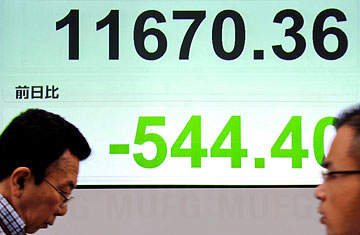
Japanese men walk past a stock market indicator board in downtown Tokyo on Sept. 16
All signs point to an ugly day in Asian markets in the wake of Wall Street's worst decline in seven years. Japan's benchmark Nikkei stock market index plummeted 4.6% in early trading, Hong Kong's Hang Seng index fell 6.5%, and Seoul's KOSPI index dropped 6.1%.
But the main worry of Asian investors isn't so much the stability of Asia's own financial system. For the most part, Asian banks and securities firms have not suffered the mortgage and property losses of their U.S. counterparts. Asia's financial institutions have become more conservative in recent years, having learned their lessons from past speculative investments in assets such as office blocks and shopping malls during the Asian financial crisis that began in 1997.
But investors are concerned about the potential negative impact Wall Street's woes will have on the U.S. economy. Though Asia's economies aren't as dependent on the U.S. market for growth as they traditionally were, exports to the U.S., Europe and Japan are still a key driving force in Asia's rapid development. Any global slowdown dims the outlook for Asia. "There will be important economic implications of the financial meltdown in the U.S. on Asia," says Dariusz Kowalczyk, chief investment strategist at CFC Seymour in Hong Kong. The continued financial chaos in the U.S., he says, raises fears in Asia that the American economy will experience a more protracted downturn. "There doesn't seem to be any light at the end of tunnel," Kowalczyk says.
So far, Asia's economies have held up quite well, but in recent weeks, economists have been scaling back their growth forecasts. Merrill Lynch last week cut its Asia GDP growth estimate to 7.7% from 7.9% for 2008, citing weak demand in industrialized economies for Asian exports. Though that's far from a recession, Merrill says that Asian growth is falling below the expected trend of about 8%. Asian policy makers have been limited in their efforts to stimulate growth because of rising inflation, which has forced most central banks to hike interest rates. Indonesia, for example, raised its benchmark rate again this month in an attempt to quell the nation's nearly 12% inflation.
Some governments, though, are becoming more worried about declining growth than inflation. In an attempt to stimulate the economy and stabilize markets, the People's Bank of China on Monday lowered its key interest rate by 27 basis points to 7.2% — the first cut since 2002. The central bank also reduced reserve requirements for some Chinese banks, a step that could increase lending. Goldman Sachs economist Hong Liang commented that the moves "clearly signaled the central bank's intention to support growth" and "could provide some badly needed boost to investors' confidence." After a dark day on Wall Street, any bit of extra confidence could help.
